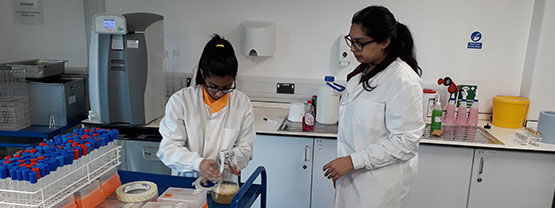Getting hands on experience through opportunities such as taking a placement year is it great way to develop skills and find out what you want to do after completing your studies. Our Biomedical Sciences students, Manmeet Panesar and Yasmin Sundi, are currently on eight month placements working as Associate Technicians, here at the University. They talked to us about their experiences so far.
Grabbing the opportunity
"When we heard about the possibility of doing a placement within the department where we study our course (BSc Biomedical Sciences), we were excited to find out more! We already know we want to work in the Biomedical Sciences field (Manmeet wants to work in research and Yasmin in analysis) after we graduate, so having this opportunity on our doorstep is great!"
A typical day as an Associate Technician
"Our primary role is to help the technicians to provide staff and students with the equipment they need for their practical sessions in our onsite labs. No two days are the same, and it certainly is strange being on the staff side of the labs! We’re only a short way into our placements, but already feel part of the team and have learned a lot. The staff have been so welcoming and are making sure we get the most out of our time with them. A typical day often starts with preparing station lists for upcoming experiments (these lists tell us all the equipment and materials that are needed for each student for their next practical session). This is something we’ve sometimes taken for granted as students, and not necessarily thought about the work that goes on behind the scenes to give us what we need during our classes, so it’s really interesting to see things from a different perspective. We certainly have a new found respect and gratitude for the behind the scenes staff! We set up the labs as needed with the necessary equipment, and be on hand during the sessions to help out if needed. Once the labs are set up for the day’s sessions, we’ll probably be asked to help make up specimens or samples for experiments. This could be making agar plates (for bacteria and other microbes to grow on), creating fake urine or blood, growing onion or garlic tips, assembling graticules in microscopes or other tasks. One day, we learned how to make anaesthetic for worms! We never know what the day can bring!"

Health and Safety
“A large part of the job is learning more about health and safety in the workplace, and for our field this includes COSHH (The Control of Substances Hazardous to Health Regulations 2002) – a law that requires employers to control substances that are hazardous to health). Health and safety in and around a laboratory environment is really important, and we are enhancing our knowledge of the various hazards involved and how to prevent harm to ourselves and others. Having the chance to do this daily and at a more in depth level is really helping us to be more safety conscious moving forward, and is good practice for our future careers. Being able to show our knowledge of and experience with health and safety could really help us stand out when it comes to job interviews once we graduate.”
Best bits
“We’re only a few months in, but there are already some highlights. So far, we’ve been lucky enough to be shown how to use equipment such as spectrophotometers, and the UV-VIS spectrophotometer, which was exciting, as we wouldn’t usually get to do this as students. We’ve also enjoyed (and are proud of) designing and implementing a blood analysis and identification experiment; assisting international students during their gram staining practical; and also helping final year students with their projects – running and maintaining the general consumables and helping with queries. This has really given us an insight into what to expect when it’s our turn next year so we can make sure things run smoothly and successfully. Let’s hope what we’ve learned over our placement gives us an edge! We’ve also been helping with the BASE workshop (Biosciences Applied Skills Enhancement) - setting out general experiments to aid the learning and development of fellow students, and helping them understand these techniques for future use and assessments."
What’s still to come?
"We’re excited that we’ll be able to help out with school outreach projects soon, and feel privileged to be helping young people discover more about biomedical science (and science in general), and hopefully inspire them to pursue further education in this area. This is likely to involve preparing the labs for school visits, or materials for staff to take into schools, and attending events such as the Big Bang Fair (which encourages young people to explore science, technology, engineering and maths) in March at the NEC. There’s still so much to learn and experience, and we’re eager to do as much as we can so we can take full advantage of our placements here at BCU."
Biomedical Science at BCU
Inspired by what you have read so far? Check out the BSc (Hons) Biomedical Sciences course page and find out more.
